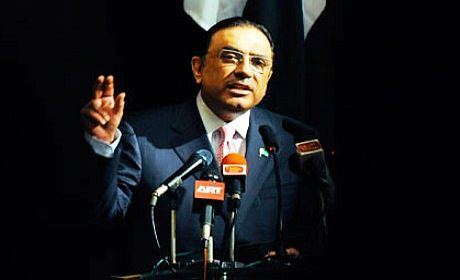Zardari and the Tehran-Beijing Dilemma

What is the precedence of the Peace gas pipeline between Iran and Pakistan?
It was almost ten years ago that talks about a trilateral agreement between Iran, Pakistan, and India began so that this gas pipeline from South Pars would join the Peace gas pipeline.
The initial intention of the two countries to enforce this agreement dates back to Mr. Khatami’s presidency, but in practice, there have been ups and downs in its signing and implementation. What is the reason behind several years of delay?
Yes, this plan was proposed during Mr. Khatami’s presidency, but India, under US pressure, was forced to leave this plan, and then Pakistan and Iran entered bilateral negotiations and pursued this plan in order to be able to implement it. This pipeline is drawn from Iran to the border, but is faced with problems from the other side. It should be mentioned that Pakistan’s excuse is that it does not have the necessary credit to invest in this plan, but it is, in fact, US pressure which still exists.
Based on this agreement, Iran’s gas will be delivered to Pakistan and India with a suitable price. Why does Pakistan, by practically preventing the enforcement of this agreement, deprive itself of Iran’s energy resources? Is there another direct and available option for Pakistan instead of Iran?
The other option is China. If the Chinese enter this plan, they can both deliver sufficient investment to the Pakistanis as loans and continue this pipeline to Tibet and western China through Pakistan. In that case, it would be economical for all, meaning that it would be good both for Iran and Pakistan, which can receive a transit fee. The reason is that the Pakistanis, based on their talks with India in the past, were supposed to receive about 160 million dollars a year as transit fees, and also meet their own needs. It must be mentioned that Pakistan is faced with lots of energy problems during the winter. Therefore, it seems that, from an economic aspect and with US pressures, China is a more acceptable option.
Asif Ali Zardari, Pakistan’s president, who was supposed to visit Tehran to sign this agreement, cancelled his trip at the last minute. What is the reason behind this?
Zardari wants this agreement to be made, because he himself is faced with domestic problems including problems related to political parties. Therefore, if he signs this agreement, it will be considered a big political point for him in the future elections. Thus, it can be said that Asif Ali Zardari, from this perspective, intends to hold successful negotiations. But the fact is that Pakistan is under US pressure and considering the aids that it receives from this country, it will be very difficult for Pakistan to feel that the Americans show serious opposition to this plan; hence, under such conditions, the Pakistanis cannot take steps forward in this regard.
Perhaps it can be said that today, political issues have more of an impact than economic ones and US pressure was the main reason behind the cancellation of this trip.
Exactly 24 hours before this trip, the US gave 20 million dollars of financial aid to Pakistan. Regional and international news agencies have also mentioned US pressure as the reason behind the cancellation of Zardari’s visit. Do you think this assessment is correct?
Relations between Iran and Pakistan must be considered beyond the issue of 20 million dollars. In other words, this amount is not a determining factor for a country which is faced with a fuel crisis. It is possible that the Americans have given these aids to Pakistan to discourage Pakistan from negotiating with Iran, but the fact is that the national interests of Pakistan oblige them to obtain safe fuel which can be provided through Iran’s channel. Therefore, I do not agree with this assessment. It is possible that this measure would have limited impacts, but the Pakistanis will not lose an agreement that can be used for 300 to 400 years in exchange for this amount. Thus, this analysis is very simplistic.
Considering US opposition, Pakistan has practically preferred Washington over Tehran. What is the perspective of Pakistan’s relations with Iran after 2014 when the Americans leave Afghanistan and Islamabad and Kabul will both need Iran’s regional help to establish security?
There is a discussion in Pakistan over whether security must be provided through the channel of regional cooperation. As you know, Iran and Pakistan have a long common border and security issues and the smuggling of narcotics are the common issues of the two countries. Afghanistan also has common issues with Iran in this regard. Therefore, these three countries must be analyzed separately from the apparent conditions. The strategic interests of these three countries lie in cooperation. It can even be said that we have a common civilization from both cultural and religious aspects. Furthermore, it is possible that short-term problems will be created, but any government which rules over Afghanistan and Pakistan needs to have cooperation with Iran. Therefore, it does not seem that a serious obstacle will be created in relation with cooperation with Iran after 2014. Of course, it must be mentioned that the American forces will not completely leave the Afghan territory; they have instead agreed to hold military bases which are more significant than their presence.
After 2014, regional issues might take other forms, because Afghanistan’s occupation will officially end and the governments of Afghanistan and Pakistan or any other group which financially supports the Taliban will be put in a new situation which can only be defined through the channel of regional cooperation.

